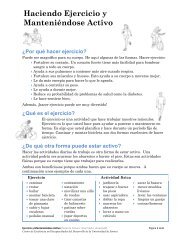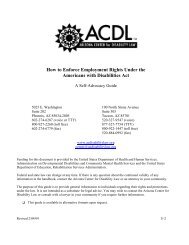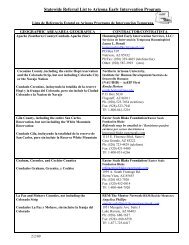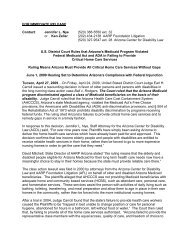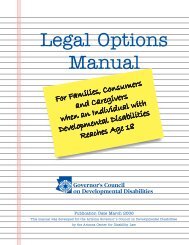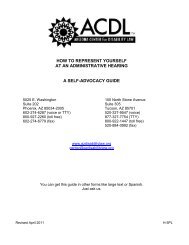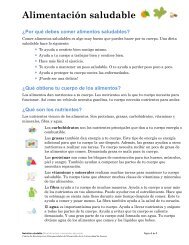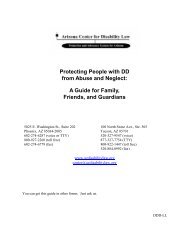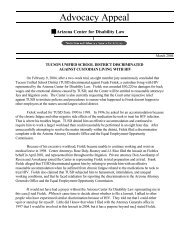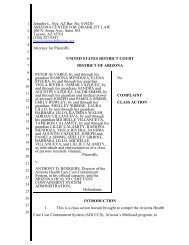Healthy Eating
Healthy Eating
Healthy Eating
Create successful ePaper yourself
Turn your PDF publications into a flip-book with our unique Google optimized e-Paper software.
<strong>Healthy</strong> <strong>Eating</strong><br />
Why should you eat healthy foods<br />
<strong>Eating</strong> healthy foods is something great you can do for your body. <strong>Eating</strong> a healthy diet does<br />
these things:<br />
Helps you feel good about yourself.<br />
Helps your body work and feel well.<br />
Makes exercise easier.<br />
Helps you stay at a healthy weight. Or, helps you lose weight slowly.<br />
Helps protect your body from getting sick.<br />
Can be delicious!<br />
What does your body get from food<br />
Food gives your body nutrients. Nutrients are what your body needs to work. Like a car<br />
needs gas, your body needs nutrients to run.<br />
What are nutrients<br />
Nutrients come from food. They are proteins, fats, carbohydrates, vitamins and minerals,<br />
fiber and water.<br />
Carbohydrates are the main nutrients that give your body energy or fuel.<br />
Fats give your body energy, too. This type of energy is extra energy for your<br />
body to use later. Also, fats help other nutrients to do their jobs. Your body<br />
needs to get a little fat from the foods you eat. Too much fat is bad for your<br />
body.<br />
Proteins are like building blocks for your bones, muscles, skin, and blood. They<br />
also help to fix parts of your body that need repair.<br />
Vitamins and minerals do many jobs to keep your body healthy. And, your<br />
body must get many kinds of vitamins and minerals from your food.<br />
Fiber helps your body in lots of ways. It helps your body use more of the<br />
nutrients from your food. It can help with constipation. It makes your tummy<br />
feel fuller for a longer time after you eat. This helps you to eat and weigh less.<br />
Fiber also helps your heart to be healthy.<br />
Water is extremely important for your body. It helps get nutrients and oxygen<br />
to all parts of your body. It helps keep your body from getting too hot. And much<br />
of your body is made up of water. You get water from the food you eat and the<br />
liquids you drink.<br />
<strong>Healthy</strong> <strong>Eating</strong> [Reading Level: intermediate, abbreviated] Page 1 of 6<br />
Sonoran University Center for Excellence in Developmental Disabilities
Vegetables<br />
Fruits<br />
Do all foods have the same nutrients<br />
No. Different foods have different nutrients. Your body needs many different nutrients to be<br />
healthy. You can get all of these by having a varied diet. This means eating foods from all<br />
five (5) major food groups. Foods in a group have similar nutrients and help your body in the<br />
same ways.<br />
What are the 5 different food groups<br />
The five main groups are vegetables, fruits, grains, meats and beans, and milk.<br />
What foods are in these groups How are they important to your<br />
body<br />
broccoli<br />
bok choy<br />
cauliflower<br />
corn<br />
peas green and wax<br />
beans<br />
lettuce<br />
spinach<br />
watercress<br />
collard greens<br />
turnip greens<br />
asparagus<br />
cucumber<br />
beet<br />
eggplant<br />
mushroom<br />
celery<br />
apple<br />
orange<br />
tangerine<br />
lemon<br />
lime<br />
grapefruit<br />
banana<br />
pear<br />
grape<br />
kiwi<br />
papaya<br />
strawberry<br />
blueberry<br />
raspberry<br />
carrot<br />
red and green pepper<br />
tomato<br />
white and sweet<br />
potatoes<br />
pumpkin<br />
winter squash kale<br />
zucchini<br />
yellow squash<br />
dry beans and peas<br />
tofu<br />
artichoke<br />
cabbage<br />
brussel sprout<br />
onion<br />
bean sprout<br />
100% vegetable juice<br />
watermelon<br />
cantaloupe<br />
honeydew<br />
cherry<br />
peach<br />
nectarine<br />
apricot<br />
plum pineapple<br />
mango<br />
avocado<br />
dried fruit (raisin,<br />
prune, apricot,<br />
peach)<br />
100% fruit juice<br />
fiber<br />
carbohydrates<br />
vitamins<br />
A, E, C, & folate<br />
minerals<br />
potassium<br />
water<br />
Vegetables & Fruits<br />
good for your heart<br />
protects your bones<br />
lowers risk of getting<br />
diabetes and some<br />
types of cancer<br />
fiber (whole or<br />
sliced fruit)<br />
carbohydrates<br />
vitamins<br />
C & folate<br />
minerals<br />
potassium<br />
water<br />
<strong>Healthy</strong> <strong>Eating</strong> [Reading Level: intermediate, abbreviated] Page 2 of 6<br />
Sonoran University Center for Excellence in Developmental Disabilities
Meats & Beans<br />
Grains<br />
Milk<br />
grains:<br />
wheat<br />
oat<br />
rye<br />
corn<br />
rice<br />
whole grain foods:<br />
brown rice<br />
wild rice<br />
popcorn<br />
oatmeal<br />
breads, crackers,<br />
tortillas, cereal and<br />
pasta made with<br />
whole grains<br />
refined grain foods:<br />
white rice<br />
bread, cracker,<br />
tortilla, cereal<br />
and pasta made<br />
with whole<br />
grains<br />
Grains<br />
whole grains lower<br />
the risk of many<br />
diseases<br />
extra fiber in whole<br />
grains makes you feel<br />
full, so you eat less<br />
fiber<br />
carbohydrates<br />
vitamins<br />
B (thiamin,<br />
riboflavin, niacin,<br />
& folate)<br />
minerals<br />
iron, selenium, &<br />
magnesium<br />
meats:<br />
beef<br />
pork<br />
lamb<br />
venison<br />
rabbit<br />
buffalo<br />
poultry & eggs:<br />
chicken<br />
turkey<br />
duck<br />
goose<br />
eggs (chicken, duck)<br />
fish:<br />
finfish (salmon, trout,<br />
halibut, snapper,<br />
bass, swordfish)<br />
shellfish (shrimp,<br />
oysters, lobster,<br />
squid, mussels,<br />
clams, crabs)<br />
canned fish (tuna,<br />
salmon, anchovies)<br />
milk<br />
flavored milk<br />
cheese<br />
yogurt<br />
dry beans & peas:<br />
beans (black, pinto,<br />
navy, garbanzo,<br />
soy or edamame,<br />
lima)<br />
peas (black-eyed,<br />
lentils, split)<br />
tofu<br />
nuts & seeds:<br />
almonds<br />
cashews<br />
hazelnuts<br />
peanuts<br />
peanut butter<br />
almond butter<br />
pecans<br />
walnuts<br />
pistachios<br />
seeds (sesame,<br />
sunflower, flax,<br />
pumpkin)<br />
pudding<br />
ice cream<br />
frozen yogurt<br />
Meats & Beans<br />
lean meats and fish<br />
are a good source of<br />
protein and iron<br />
some foods from this<br />
group (salmon, flax<br />
seeds, walnuts)<br />
contain omega-3 fatty<br />
acids – healthy fats<br />
that reduce the risks<br />
of certain diseases<br />
and provide other<br />
health benefits<br />
protein<br />
fat<br />
vitamins<br />
B (niacin, thiamin,<br />
riboflavin, B6) & E<br />
minerals<br />
iron, zinc,<br />
magnesium<br />
Milk<br />
helps build and<br />
protect your bones<br />
fat<br />
carbohydrates<br />
vitamins<br />
calcium, D<br />
minerals<br />
potassium<br />
water<br />
<strong>Healthy</strong> <strong>Eating</strong> [Reading Level: intermediate, abbreviated] Page 3 of 6<br />
Sonoran University Center for Excellence in Developmental Disabilities
Oils &<br />
Others<br />
Is there another group<br />
Yes. Oil & Others is a not a main food group. They give your body fat and carbohydrates but<br />
not a lot of protein, fiber, vitamins or minerals. Some of these do have something called „fatty<br />
acid‟ which your body needs. Luckily, your body gets these from some foods in the main food<br />
groups.<br />
fats<br />
oils from fish<br />
oils from nuts<br />
liquid oils<br />
candy<br />
cookies<br />
cakes<br />
How do you choose healthy foods<br />
chips and other salty<br />
snacks<br />
mayonnaise<br />
cream cheese<br />
butter<br />
margarine<br />
soft drinks<br />
fat<br />
carbohydrates<br />
Vegetables, fruits and whole grain foods are the best choices. Eat many different types of<br />
these foods. Try to make them the main part of your diet.<br />
Fat-free and low-fat milk, cheese, or yogurt are other healthy food choices.<br />
Choose types of meat, fish, and poultry that have little fat.<br />
Which vegetables are the healthiest<br />
Brightly colored red, yellow, orange and dark green are super choices. Try red, yellow, or orange<br />
peppers, broccoli, kale, spinach, sweet potatoes and carrots. These are especially great for your<br />
body. They are loaded with good nutrients.<br />
Which fruits are the healthiest<br />
Eat a variety of fruit to help your body get what it needs. Good choices to have often are<br />
bananas, prunes, dried peaches and apricots, cantaloupe, honeydew melon and orange juice.<br />
What about whole grains<br />
Whole grain foods are grains like brown rice and popcorn and also breads and crackers that<br />
have the words “whole grain” or “whole”. Grain foods that aren‟t whole are refined. Refined<br />
grains lose fiber and other things that are good for your body. So, think “whole”!<br />
What about water<br />
Oils & Others<br />
does not help your body<br />
(except for healthy fats)<br />
high in fat and/or sugar<br />
only eat these<br />
occasionally<br />
There is no set rule on how much you should drink each day. Here are some tips to keep your<br />
body hydrated:<br />
Your urine should be a pale to yellow color. If it is dark, you may not be getting<br />
enough water.<br />
Answer your thirst – if you are thirsty, drink!<br />
On hot days and when you exercise, your body will need more water.<br />
<strong>Healthy</strong> <strong>Eating</strong> [Reading Level: intermediate, abbreviated] Page 4 of 6<br />
Sonoran University Center for Excellence in Developmental Disabilities
Daily Food Needs<br />
Which foods are best to limit<br />
Try to eat only a small amount, if any, of these foods:<br />
foods high in fat [especially trans-fat & saturated fat]<br />
foods with a lot of added sugars [soda, sugary cereal]<br />
foods with a lot of salt [potato chips, processed foods]<br />
alcohol [high ball, beer, wine]<br />
Which foods are best to avoid<br />
Most fast food is unhealthy. Fast food is usually very high in bad fats and added<br />
sugars. Fast food servings also tend to be more food than you need.<br />
What and how much should you eat<br />
Each person has different food needs. The types and amount of food your body needs<br />
depends on many things. Some of these things are how old you are, if you are male or<br />
female, how much you weigh and how active you are. Also, some people have special food<br />
needs.<br />
Talk to your doctor to find out how much your body needs. Another way to find out is to go<br />
to the website www.mypyramid.gov. You can type in information about yourself. It will<br />
figure out how much of each kind of food your body needs.<br />
Here is an example of what an average adult needs daily from each group:<br />
Vegetables<br />
2 ½<br />
cups<br />
1cup =<br />
1 cup raw or cooked vegetables, or<br />
vegetable juice<br />
2 cups raw leafy greens<br />
Fruits<br />
2<br />
cups<br />
1 cup = 1 cup fruit or 100% fruit juice<br />
½ cup dried fruit<br />
Grains<br />
6<br />
ounces<br />
1 ounce = 1 slice bread<br />
1 cup dry cereal<br />
½ cup cooked rice, pasta, or cereal<br />
Meats &<br />
Beans<br />
Milk<br />
5 ½<br />
ounces<br />
3<br />
cups<br />
1 ounce = 1 ounce meat, poultry, or fish<br />
¼ cup cooked dry beans<br />
1 egg<br />
1 tablespoon of peanut butter<br />
½ ounce of nuts<br />
1cup =<br />
1 cup milk or yogurt<br />
1 ½ ounces of cheese<br />
<strong>Healthy</strong> <strong>Eating</strong> [Reading Level: intermediate, abbreviated] Page 5 of 6<br />
Sonoran University Center for Excellence in Developmental Disabilities
Tips for <strong>Healthy</strong> <strong>Eating</strong><br />
Think fruits, vegetables, whole grains, low-fat or fat-free milk products, and meats that<br />
have little fat.<br />
Drink water instead of soda.<br />
Eat only small amounts of fats like butter, margarine, and mayonnaise.<br />
If you are going to have a piece of candy that is high in sugar and/or fat, make it a<br />
small one and think of it as a treat.<br />
Eat when you are hungry. If you are bored or upset, go for a walk instead of eating.<br />
Eat slowly so you don‟t eat too much. It takes about 20 minutes for your stomach to tell<br />
your brain that it is full.<br />
Eat at least three meals a day. One of these should be breakfast.<br />
Make your lunch to take with you instead of eating out.<br />
Let everyone know that healthy eating is important to you.<br />
Keep a “healthy eating log”<br />
At home:<br />
Keep only healthy foods in your kitchen. When shopping for groceries, emphasize<br />
whole foods over processed foods.<br />
Use a salad plate instead of a dinner plate to control portion size.<br />
Avoid eating family-style. Instead, plate meals at the kitchen counter and<br />
immediately freeze or refrigerate extras.<br />
Avoid eating meals in front of the television.<br />
Trim fat from meat and poultry.<br />
Instead of frying, try using these cooking methods: broiling, baking, grilling,<br />
roasting, steaming, and poaching.<br />
Dining out:<br />
Split an entrée with a friend.<br />
If the portion size is large, decide how much you will eat and have the rest boxed<br />
to take home.<br />
Choose baked, grilled, poached, broiled, roasted, or steamed menu items instead<br />
of one that is fried.<br />
Rethink what eating out means. Rather than an excuse for overeating, think of it<br />
as part of your healthy way of eating.<br />
Enjoy!<br />
<strong>Healthy</strong> <strong>Eating</strong> [Reading Level: intermediate, abbreviated] Page 6 of 6<br />
Sonoran University Center for Excellence in Developmental Disabilities



